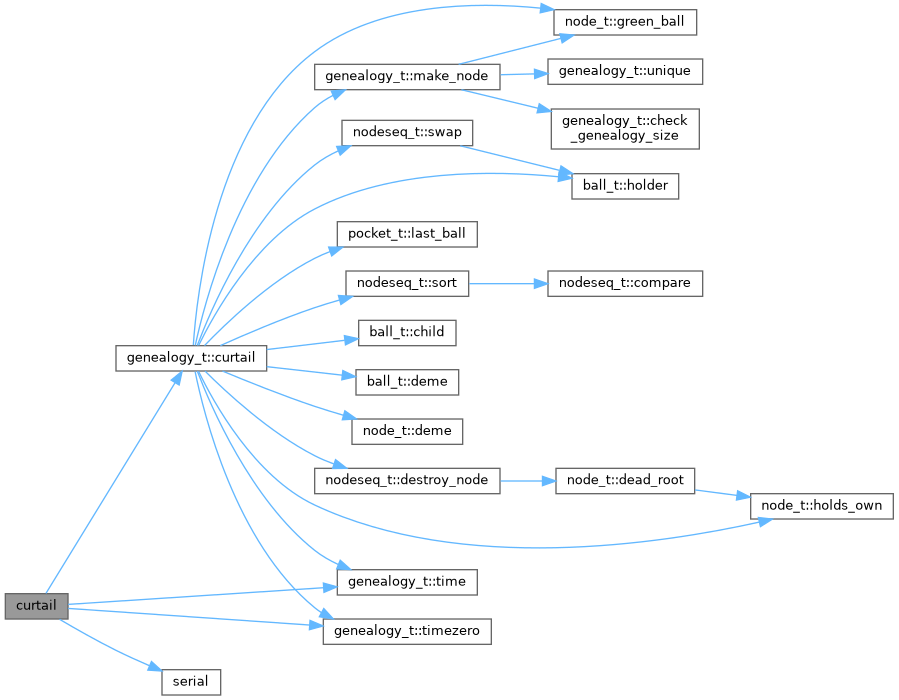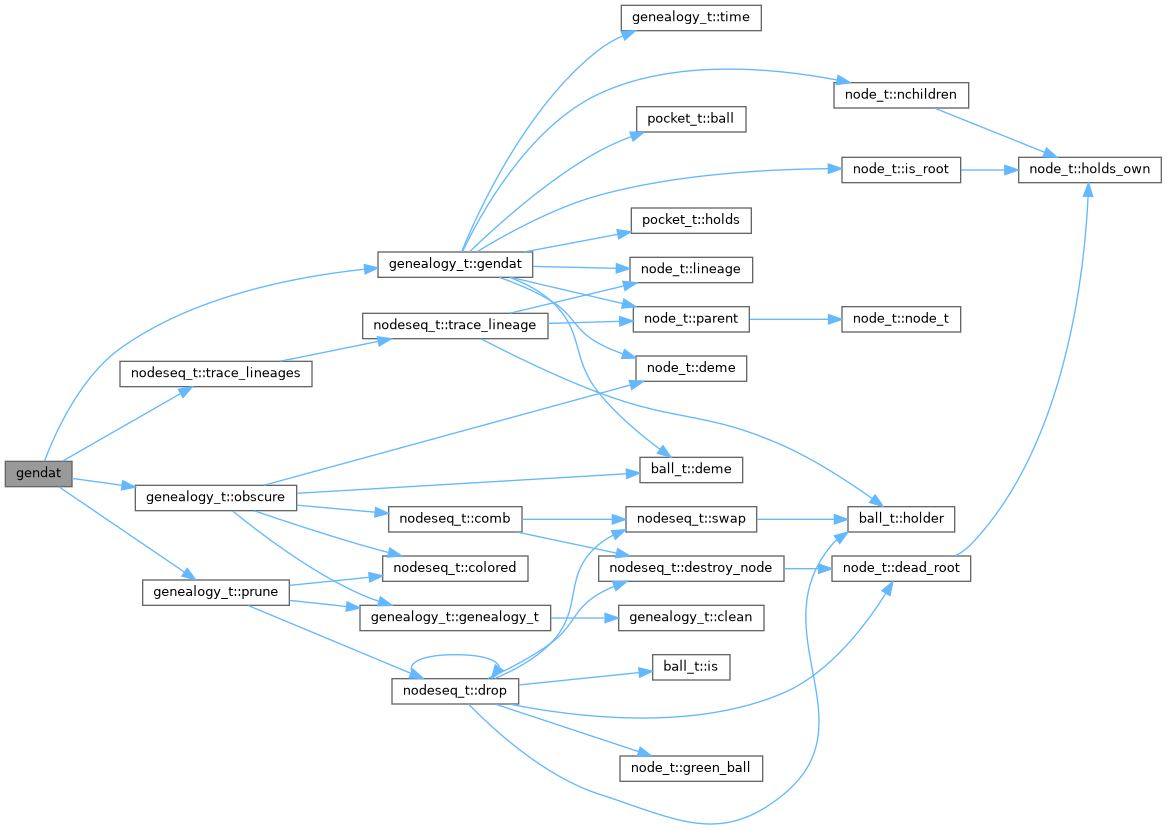Loading...
Searching...
No Matches
Include dependency graph for init.c:

Go to the source code of this file.
Functions | |
| SEXP | parse_newick (SEXP, SEXP, SEXP) |
| SEXP | getInfo (SEXP) |
| SEXP | curtail (SEXP, SEXP, SEXP) |
| curtail the given genealogy | |
| SEXP | yaml (SEXP) |
| extract a YAML description | |
| SEXP | gendat (SEXP, SEXP) |
| data-frame format | |
| DECLARATIONS (LBDP) | |
| DECLARATIONS (Moran) | |
| DECLARATIONS (S2I2R2) | |
| DECLARATIONS (SEIR) | |
| DECLARATIONS (SI2R) | |
| DECLARATIONS (SIIR) | |
| DECLARATIONS (SIR) | |
| DECLARATIONS (Strains) | |
| DECLARATIONS (TwoSpecies) | |
| DECLARATIONS (TwoUndead) | |
| void | R_init_phylopomp (DllInfo *info) |
Variables | |
| get_userdata_t * | get_userdata |
| get_userdata_double_t * | get_userdata_double |
| get_userdata_int_t * | get_userdata_int |
| static const R_CallMethodDef | callMethods [] |
| static const R_CallMethodDef | extMethods [] |
Function Documentation
◆ curtail()
| SEXP curtail | ( | SEXP | State, |
| SEXP | Time, | ||
| SEXP | Troot ) |
curtail the given genealogy
Definition at line 10 of file bare.cc.
10 {
11 genealogy_t A = State;
12 double t, t0;
13 t = *REAL(AS_NUMERIC(Time));
14 t0 = *REAL(AS_NUMERIC(Troot));
17 A.curtail(t,t0);
18 SEXP out;
19 PROTECT(out = serial(A));
20 SET_ATTR(out,install("class"),mkString("gpgen"));
21 UNPROTECT(1);
22 return out;
23 }
Here is the call graph for this function:

◆ DECLARATIONS() [1/10]
| DECLARATIONS | ( | LBDP | ) |
◆ DECLARATIONS() [2/10]
| DECLARATIONS | ( | Moran | ) |
◆ DECLARATIONS() [3/10]
| DECLARATIONS | ( | S2I2R2 | ) |
◆ DECLARATIONS() [4/10]
| DECLARATIONS | ( | SEIR | ) |
◆ DECLARATIONS() [5/10]
| DECLARATIONS | ( | SI2R | ) |
◆ DECLARATIONS() [6/10]
| DECLARATIONS | ( | SIIR | ) |
◆ DECLARATIONS() [7/10]
| DECLARATIONS | ( | SIR | ) |
◆ DECLARATIONS() [8/10]
| DECLARATIONS | ( | Strains | ) |
◆ DECLARATIONS() [9/10]
| DECLARATIONS | ( | TwoSpecies | ) |
◆ DECLARATIONS() [10/10]
| DECLARATIONS | ( | TwoUndead | ) |
◆ gendat()
| SEXP gendat | ( | SEXP | State, |
| SEXP | Obscure ) |
data-frame format
Definition at line 32 of file bare.cc.
32 {
33 genealogy_t A = State;
34 A.prune();
36 A.trace_lineages();
38 }
void gendat(double *tout, int *anc, int *lin, int *sat, int *type, int *deme, int *index, int *child) const
genealogy information in list format
Definition genealogy.h:233
Here is the call graph for this function:

Here is the caller graph for this function:

◆ getInfo()
| SEXP getInfo | ( | SEXP | args | ) |
extract requested information prune and/or obscure if requested
Definition at line 19 of file getinfo.cc.
19 {
20 const char *argname[] = {
21 "object","prune","obscure",
22 "t0","time","nsample","ndeme",
23 "description","structure","yaml","newick",
24 "lineages","gendat","genealogy"};
25 const int narg = sizeof(argname)/sizeof(const char *);
26 bool flag[narg];
27 SEXP object = R_NilValue;
28 size_t nout = 0;
29 int k;
30
31 for (k = 0; k < narg; k++) flag[k] = false;
32 args = CDR(args);
33
34 while (args != R_NilValue) {
35 const char *name = isNull(TAG(args)) ? "" : CHAR(PRINTNAME(TAG(args)));
36 SEXP arg = CAR(args);
38 if (j == 0) {
39 object = arg;
40 flag[0] = true;
41 } else if (j < 3) {
42 flag[j] = *LOGICAL(AS_LOGICAL(arg));
43 } else if (j < narg) {
44 flag[j] = *LOGICAL(AS_LOGICAL(arg));
45 if (flag[j]) nout++;
46 } else {
48 }
49 args = CDR(args);
50 }
51
53 genealogy_t A = object;
54
55 // prune and/or obscure if requested
56 const bool *f = flag+1;
59 A.trace_lineages();
60
61 SEXP out, outnames;
62 PROTECT(out = NEW_LIST(nout));
63 PROTECT(outnames = NEW_CHARACTER(nout));
64 k = 0;
65 if (*(f++)) { // t0
67 }
68 if (*(f++)) { // time
70 }
71 if (*(f++)) { // nsample
73 }
74 if (*(f++)) { // ndeme
76 }
77 if (*(f++)) { // description
79 }
80 if (*(f++)) { // structure
82 }
83 if (*(f++)) { // yaml
85 }
86 if (*(f++)) { // newick
88 }
89 if (*(f++)) { // lineages
91 }
92 if (*(f++)) { // gendat
94 }
95 if (*(f++)) { // genealogy
96 SEXP S;
100 UNPROTECT(1);
101 }
102 SET_NAMES(out,outnames);
103 UNPROTECT(2);
104 return out;
105 }
static size_t matchargs(const char *prov, const char **set, size_t n)
Definition getinfo.cc:7
static int set_list_elem(SEXP list, SEXP names, SEXP element, const char *name, int pos)
Definition internal.h:67
Here is the call graph for this function:

◆ parse_newick()
| SEXP parse_newick | ( | SEXP | X, |
| SEXP | T0, | ||
| SEXP | Tf ) |
A parser for Newick code. Returns a genealogy in the phylopomp format.
Definition at line 10 of file parse.cc.
10 {
11 PROTECT(X = AS_CHARACTER(X));
12 PROTECT(T0 = AS_NUMERIC(T0));
13 PROTECT(Tf = AS_NUMERIC(Tf));
14 double t0 = *REAL(T0);
15 double tf = *REAL(Tf);
16 // parse the Newick representation into a genealogy:
17 std::string x = CHAR(STRING_ELT(X,0));
18 genealogy_t G(t0);
19 G.parse(x,t0);
20 if (!ISNA(tf)) {
21 G.curtail(tf,t0);
22 }
23 G.trace_lineages();
24 UNPROTECT(3);
26 }
Here is the call graph for this function:

◆ R_init_phylopomp()
| void R_init_phylopomp | ( | DllInfo * | info | ) |
◆ yaml()
| SEXP yaml | ( | SEXP | State | ) |
extract a YAML description
Definition at line 26 of file bare.cc.
26 {
27 genealogy_t A = State;
29 }
Here is the call graph for this function:

Here is the caller graph for this function:

Variable Documentation
◆ callMethods
|
static |
Initial value:
= {
METHODS(LBDP),
METHODS(Moran),
METHODS(S2I2R2),
METHODS(SEIR),
METHODS(SI2R),
METHODS(SIIR),
METHODS(SIR),
METHODS(Strains),
METHODS(TwoSpecies),
METHODS(TwoUndead),
{"parse_newick", (DL_FUNC) &parse_newick, 3},
{"curtail", (DL_FUNC) &curtail, 3},
{"yaml", (DL_FUNC) &yaml, 1},
{"gendat", (DL_FUNC) &gendat, 2},
{NULL, NULL, 0}
}
◆ extMethods
|
static |